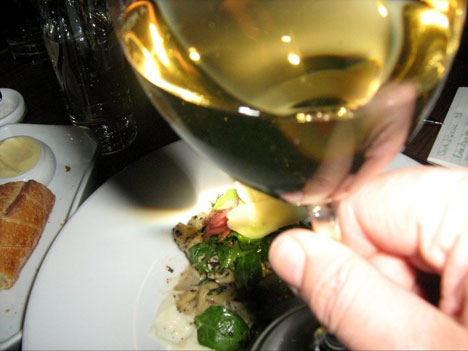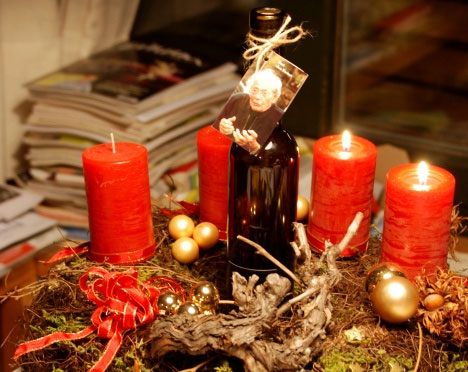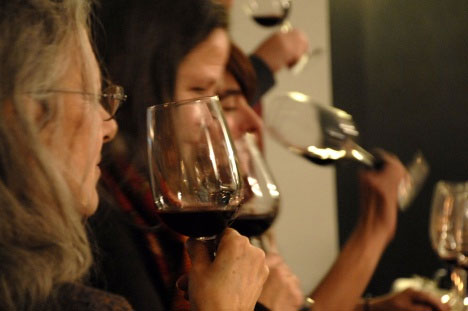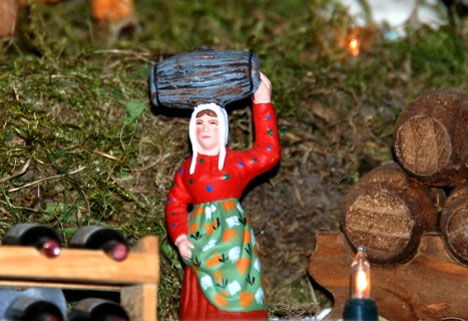He gave me no peace, the perfect Christmas wine. A diligent writer in the forum of Wein-Plus brought it into play. Just like that, probably to be understood as an award or value judgement, as praise or linguistic helplessness. You can turn it around however you want. The "perfect Christmas wine" remains a fiction, possibly even a beautiful, enjoyable one. There was then promptly an outcry in the forum: What is this, a "perfect Christmas wine"? Perfect - I think - derives from the Latin "perfectum", which means something like "perfect". Maybe there is such a thing, the perfect wine - maybe, but I haven't come across it yet, despite hundreds, yes, thousands of attempts. Just bad luck?

|
| Festive food - festive wine - something special (Photo: Peter Züllig) |
It goes further: a Christmas wine - does it taste different, better, even sweeter than the Good Friday, Easter or Whitsun wine? Or is it simply the wine you drink at Christmas? But why should that one in particular be perfect? The problem - I admit it - just won't let me go. Is it just linguistic or is there more to it, something I don't know, that I don't know? Is it a very special kind of wine? Spontaneously, mulled wine comes to mind, but it is anything but perfect, at least not as a wine. The suspicion thickens: this is not so much a wine problem as a language problem. One is looking for a suitable expression for something that is supposed to be special, in this case for a wine that one drinks at Christmas. This expands the question: What do you drink at Christmas? There is no rule, certainly no order. Not even a meaningful average can be calculated. And yet it is supposed to be perfect?

|
| Search for the perfect Christmas wine (Photo: Peter Züllig) |
The more I think about it, the more I get into hot water. Yet Christmas - as I understand it - is something heavenly. One could go on with the language and concept game. That is not my point. The "perfect Christmas wine" is an example of how difficult we find it to describe perceptions and feelings. One time it sounds kitschy-sweet, the other time brute-direct, but hardly ever how one really feels. Auxiliary constructions are needed: perfect is still harmless, Christmas wine a mere empty phrase. Clever people avoid the problem in the wine enjoyment rating, they assign points. There are even scales for this - different ones, but somewhat standardized. The question remains: How does the enjoyment, the experience, the feeling of a 97-point wine compare to one with 87 or even 77 points? And what is the difference between a Christmas and New Year's wine?
Professional wine critics have created a few terms for the characteristics of a wine. Some of them are easy to understand, even if you're a layman: mineral (for example), pure (maybe), powerful (there's usually no comparison), concentrated (a matter of experience), exotic (depends on where you're from), radiant fruit (I have a hard time with that, how can a fruit "radiate"?), long finish (can be measured, but everyone experiences the after-effect differently)... And so then come the auxiliary terms, analogies: Fruits above all, berries, spices, smells, experiences from all walks of life, from stables to tar roads and wet socks to the fur of animals.

|
| Degustation - search for the right terms (Photo: Marcello Weiss) |
But even these are only auxiliary constructions. Some of them are easy to understand, others less so. Who knows what the gland on the belly of a musk deer smells like? What does a cedar seasoning taste like? What is the difference between dark and light mushrooms? How does a floral character express itself? No, that's as close as we're going to get. These are all honorable comparisons, qualities and characteristics that, with practice, you can certainly elicit from a wine during a sensory review. For the wine taster this may be helpful, for the wine connoisseur rather burdensome. His feelings are not in there. His feelings remain unspoken. That's why people sometimes resort to striking phrases like "perfect wine" or "Christmas wine". But the wine catalogued in this way has far more characteristics - perhaps it is precisely these that make it a "Christmas wine": for example, a "hedonistic style". Ancient Greeks we have only a few left among us, but the term is - thanks to the internet - easy to interpret: Hedonism (from ancient Greek ἡδονή, hēdonḗ) means roughly joy, pleasure, delight, sensual desire. Yes, there's something Christmassy in that already. I have more trouble with the frequently used term sexy. I don't know if I'm wrong about that. But wine has little to do with sex, unless, of course, too much alcohol is the end of sex. But - perhaps this is just a rhetorical flourish. Who knows?

|
| In the wine cellar of a Provençal nativity scene - viticulture and drinking are part of the Christmas mood and tradition (Photo: Peter Züllig) |
These are all sometimes funny, sometimes annoying, sometimes helpless remarks and reflections on what one wants to express in words. Namely, the special, the extraordinary, the outstanding taste and enjoyment experience. Slogans like "mega-awesome", "food-friendly", "hearty-crunchy" and whatever they're all called (we're inundated with them in wine advertising at the moment) don't help either. Nor does ironization help, as it always does in such moments - moments of speechlessness. I discovered a delicious example here, performed by actor Louis de Funès (easily understandable even without French): http: //www.youtube.com/watch?v=opdC4_DC6Yg&feature=related
But let's go back to the Christmas wine, which concerns me so much and about ten other readers and writers in the forum as well. For example: In my opinion, a "Christmas wine is something special, not necessarily a bargain. The wine should be oriented towards the Christmas menu and from my point of view, it can be a bit of a highlight on such an occasion", writes one reader. These are a few more hints, but still far from an answer to the question of the ultimate Christmas wine.
Perhaps a little resigned, the forum writer states: "A few days ago, 100 ideas for it were presented in the Wine Spectator. Adding the last 10 years makes 1000 and they are far from being complete." A hundred Christmas wines, yes a thousand and much more... I can only hold on to that: It must be something special. But isn't that a lot of wines and a lot of words for a simple statement: something special? I come across a figure who has been part of the Christmas tradition in the south of France for more than 200 years as the "Santons" ("Little Saint"). Everyone knows him, everyone knows what is meant by it: the Ravi, the ravished one.

|
| Figure of Ravi as Santons in the traditional nativity figures of Provence - an expression of unadulterated delight (Photo: Peter Züllig) |
He cannot put it into words, simply holds up both arms as a sign of joy, surprise, happiness. In fact, this gesture is still very common in Provence today, as soon as one speaks of something that touches the emotions rather than the mind. Wordlessness. An expression of the body that is difficult to interpret for those who only ask for facts, analysis, evidence. The Ravi should accompany every wine, if he then raises both arms, then we have found him, the "perfect Christmas wine". The Ravi is right: He doesn't need names, he only needs his emotions and they are more honest than even so many words I can read in connection with Christmas and holidays in advertisements at the moment. I therefore do not wish you a perfect Christmas, nor the perfect wine to go with it. But the perfect Ravi - as a companion. In other words: I wish you silence in happy moments - also when enjoying wine.
Sincerely
Yours